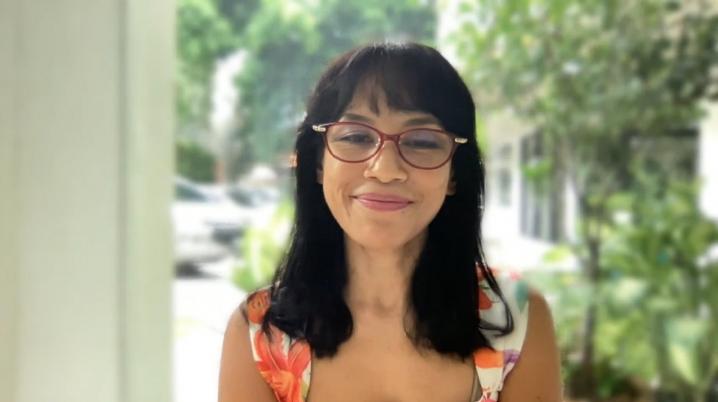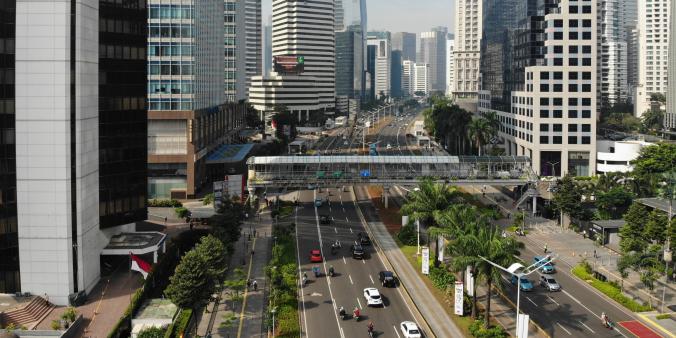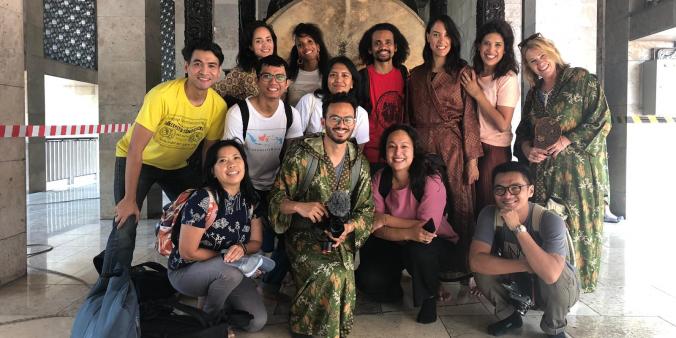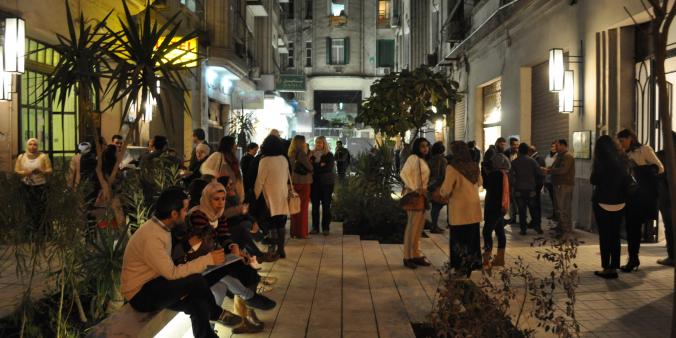
Keynote speaker Ayu Utami at Artists in Conversation: "Trust is the basis of gotong-royong"
"Gotong-royong is a very special expression that most Indonesians will understand. It means: doing things together. Or, more precisely, building good things together. Despite that the root of the Indonesian language is Malay, the word gotong-royong originated from the Javanese language. It entered into the foundational narration of the nation of Indonesia thanks to Sukarno, the proclaimer of Indonesia’s independence and the first president of Indonesia.
In fact, he said, if he has to extract the Pancasila, or the five pillars of Indonesian foundation, into three pillars, it would be socio-nationalism (hmm), socio-democracy, and the belief in God. But if he has to extract again these three into one, it would be gotong royong. Gotong-royong is, in other words, the base of the base, the extraction of Indonesia in one expression!
But, can you sense what is special with this one word formula, compared to the three formula or even the five formula, the Pancasila? This one word formula doesn’t have any content. It is not about any content. It is about mechanism. When we say words like socio-nationalism, socio-democracy, belief in God, we understand their content, the values and ideology contained in the concept. But when we say gotong-royong, or building-things-together, it is not about any content value. It is about a mechanism.
So, when Sukarno said that the basic of the basic of Indonesia is gotong-royong, he must have sensed that this mechanism has worked, is working, and will work beyond identity or ideology. Whether you are a religious person, a communist, a nationalist, or a simple person, we can build things together. The rest, we can find ways to negotiate later on. Because, building-things-together is a mechanism regardless of your values or ideology.
Now, in these two difficult years of the global Covid-19 pandemic, gotong-royong is again what most Indonesians opt for. No exception is the artists or 'culture workers'. In the first months of the pandemic outbreak, the government was faced with two choices: to implement a total lockdown or to find another way. The opposition and some activists tried to put pressure through the social media in order that the government applies a total lockdown. However, we know that lockdown has serious consequences. If the government failed to support the citizens with their basic needs during the lockdown, looting and riots will likely happen. Looting and riots are worse than pandemics.
The government found another way. It chose to apply social distancing regulation that will be reviewed periodically—which I think is a very right choice—combined with other policies and social support instruments. It even targeted low-income art and culture workers with some social support (even though the distribution didn’t always reach its targets). There were also different kinds of support for cultural activities. Artists and culture workers were also given priority for receiving vaccines (probably considering that they will help with the vaccine campaign). Despite the lack of effectiveness of the local bureaucracy, the government managed to communicate its goodwill and build trust. And trust is the basis of gotong-royong.
With trust in the air, the art and culture workers work together, gotong-royong, to build support among each other. Several art organisers tried to innovate with online medium. For example: in the first year of the pandemic, Studio DSS Music produced virtual concerts with musicians playing from different rooms or places, called Konser 7 Ruang (Seven Spaces Concert). Revenue form viewer’s donations was to be shared between artists, workers, and the production team. Salihara Art Space recreated the documentation of its previous performances into a new online shows and gave small honorarium to the artist whose work was re-shown. Festivals were held online. There were also several solidarity efforts like Friends Helping Friends among writers, in which more prominent writers held book sales and donate to the less lucky writers. I can not say that all the efforts are successful. Perhaps none of the gotong-royong ad-hoc innovations have given satisfactory results. But, I think, to prolong the trust is to prolong our breath in order that we can survive the waves of the pandemic.
The pandemic has somehow reduced the social and political tension powered by religious sentiment that had built up for years and had gained momentum in 2016 with the 212 demonstration against the Chinese Jakarta governor Ahok. We know the story. Ahok was libeled with blasphemy and, through a highly pressured court process, he was sentenced to jail. The 212 movement is regarded by its proponent as the victory of the Islamic movement. Of course not all Indonesian Muslims agree with it.
Here, I want to go back to the time of the establishment of Indonesia, in the 40s. Already when Sukarno (re)formulated the five foundational pillars of Indonesia, the Pancasila, this new nation had faced tensions between option for a religious identity and a national identity. The first option is translated as the establishment of an Islamic state or the implementation of the syaria law. The second option is translated into a more middle-way state in which religious universal tenets and spirits can inspire the legal system through democracy. We know the story. In the history of Indonesia, the second option prevails so far, with inspirations of the first option looming and reappearing from time to time.
Trends in literature and films can also show this. When I wrote my first novel, Saman, 20 something years ago, it was apparently the end of the military regime—without us knowing it. The atmosphere at the millennial turn was a revulsion to authoritarianism. Readers, craving for freedom, welcomed the novel enthusiastically because it was regarded to have spoken and been critical about politics, religion, and sexuality openly and in a new way. It became a bestseller, followed by publishers seeking writers who wrote freely regarding politics, religion, and sexuality. The beginning of 2000 was the euphoria of LBGTs novels and the spring of Q (Queer) Film Festival.
Within seven years the trend of liberty was taken over by another trend, namely religiosity and new conservatism. Islamic novels gained a huge readership. Ayat-Ayat Cinta (Verses of Love), a novel by Habiburrahman El Shirazy, epitomized the trend both in the book and film industry. In conjunction with this were political efforts to apply syaria inspired law, such as the “Anti-Pornography and Pornoaction[sic] Bill” and several local regulations relating dress code, gender, and alcohol. Not to mention the rise of power of certain paramilitary groups like Islamic Defender Front. If we are allowed to group these trends as one, then this trend that used religious sentiment culminated in the imprisonment of Ahok, the Chinese-Christian governor of Jakarta.
This trend seems to have quietened down during the pandemic. We can not say that it is because of the pandemic. There are many variables of causes and the outcome is yet to come. However, we can sneak a peek into the trend in literature and film. There was no groundbreaking new novel, film or trend within the last five years I think. However, the religious trend has descended overall and more critical views on religion are expressed in literature (Feby Indirani’s short story collection Bukan Perawan Maria/ Not The Virgin Mary, Ahda Imran’s poetry book Lidah Orang Suci/ The Saint’s Tongue). In films produced during the pandemic we also see more stories questioning conventional and conservative morality. Many of the writers, artists, and culture workers involved in the production of these were involved in the gotong-royong, the building of support and solidarity together during the pandemic.
Again, when Sukarno formulated gotong-royong, I assumed, even if he didn’t write it explicitly, he must have sensed that the word gotong-royong is about the mechanism of living together and not about identity and ideology. Sometimes, the mechanism can be more important than the content. It is not a formal-procedural mechanism. It is the mechanism that will generate its value on living together."





